A source for sharing stories of inclusion and belonging, bold activism and local change-makers in action.
The mission of this platform is to amplify diverse voices and “good news” stories from within the disability community in Snohomish County and across the region.
*The Arc Amplified is an online publication of The Arc of Snohomish County. Learn more about our mission and values at arcsno.org/about
Do you have a story of inclusion you want to share?
Are you leading local advocacy efforts? Has your family or loved one benefited from activities or programs in Snohomish County that are designed to advance community inclusion?
We want to know!
Send an email to:
Courtney Criss
Leadership & Advocacy Program Manager
Courtney@arcsno.org
or call (425) 258-2459 x 106.
Housing Considerations and Helpful Resources for People with Disabilities

Housing Considerations and Helpful Resources for People with Disabilities
In this post, we seek to highlight some helpful resources for individuals with disabilities, their care-partners and families, who want to better understand housing policies and the options available to people with disabilities. The resources below may be especially helpful for those who are new to the world of disability and housing and/or the vast array of issues (e.g. finances, caregiving) that can impact available housing options and financial support.
The Arc of Snohomish County
Housing Resources — arcsno.org/resources/housing
Washington State Department of Social and Health Services (DSHS)
Community Residential Services for Adults
Information: Community First Choice (CFC) & Home- and Community-Based Services (HCBS)
Community Homes
A nonprofit organization that provides, promotes and sustains exceptional community-based housing for adults with intellectual and developmental disabilities.
Informational Webinars: Housing Readiness Workshops
Washington State Father’s Network
A nonprofit organization connecting and supporting the fathers and male caregivers of children with disabilities and complex medical needs.
On March 1st, 2022, the Father’s Network will host a webinar/workshop on the topic “Planning for Housing: Accessing Benefits, Roommate Matching, and Shared Living Development Services.” Register to attend this workshop, and others, at fathersnetwork.org/training-workshops.
Open Doors for Multicultural Families
A nonprofit organization providing culturally and linguistically relevant information, services and programming for diverse families of persons with developmental and intellectual disabilities. Access information, or connect with Open Doors staff, at multiculturalfamilies.org.
Grow Your Advocacy Chops!
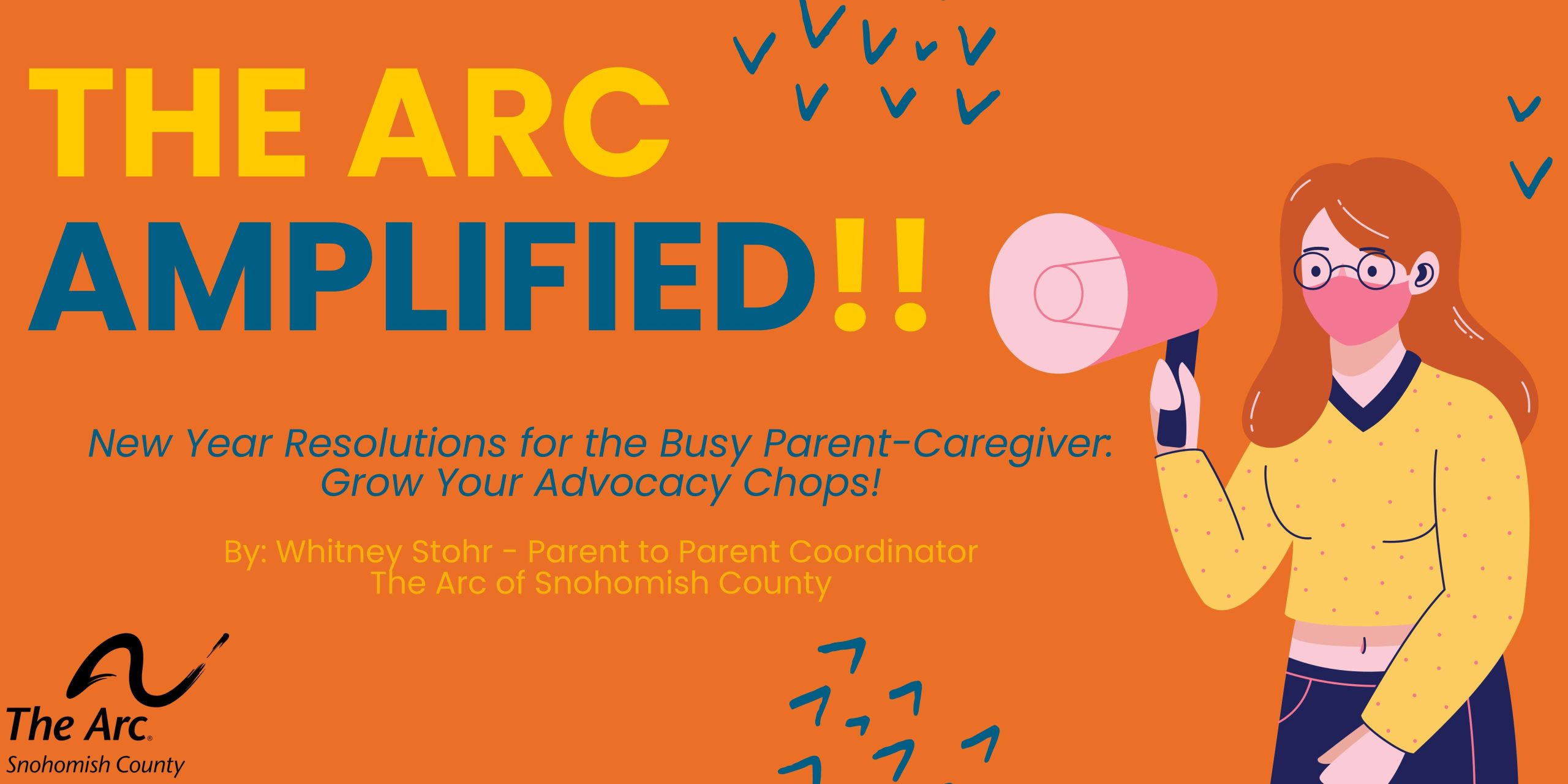
New Year Resolutions for the Busy Parent-Caregiver:
Grow Your Advocacy Chops!
A sentiment often shared by parents of children with disabilities is their wish to get more involved in advocacy efforts. It is obvious they possess unique experiences and an understanding of social and political issues that impact their kids and their families. Parents and caregivers have important stories to share and wonderful ideas to improve policies to better serve their kids and communities.
It is abundantly clear that parents of kids with disabilities are ready to step up as community change-makers. They possess the knowledge, the experience, the skills, the passion and the pragmatism.
What they do not often possess is time.
Parents are busy. All parents are busy. It is often part of the gig of becoming a parent.
But, parents of kids with disabilities are off-the-charts busy. We all know this.
Parents of kids with disabilities do all the regular parenting stuff…
And then, second-shift parenting begins, during which parents transform into a caregiver, a nurse, a teacher, a therapist, a pharmacist, a personal assistant, and more…
And all of this is in addition to whatever type of outside employment parents may hold, and whatever parenting or caregiving is required for their other children or family members.
THE RESULT: Many parents of kids with disabilities want to get involved in advocacy, but they do not see how that can be done.
THE ANSWER: Incrementally.
Small steps, my friends.
It is easy to feel overwhelmed when considering how to become involved in advocacy. There are so many policies that need attention. There are so many issues that need dedicated champions to push for change. That is obvious. However, it is impossible for one person to advocate, with any degree of commitment, on *all* the issues. And, that, too, is okay.
Your involvement in advocacy, at any level, on whatever issue, or issues, are most important to you, is absolutely worth it. Your presence makes change happen.
So, for those parents and caregivers who want to step up their advocacy game in 2022, here is a RESOLUTION for you:
Commit to 20 minutes of dedicated advocacy once per week.
Put it on your calendar and treat it as an appointment that you must keep.
That is it. Start there — with that first incremental step — and see where your year takes you….
Use that 20 minutes to read — without distraction — books and articles about what it means to be an advocate, or how to engage in the advocacy process.
Use that 20 minutes to write — without distraction — about your personal advocacy goals. Advocacy can occur at all levels of government. Do you want to advocate for increased accessibility at local playgrounds? Do you want to advocate in the local school district for increased inclusion of kids with disabilities in general education? Is there a state law that really needs to change? Is there a national advocacy group that you dream of joining? Whatever it is, write those goals down on paper, and tape that piece of paper to your bathroom mirror. Look at it every morning when you are brushing your teeth. Think about those goals in the shower. Keep thinking about them.
Use that 20 minutes each week to study issues that are important to you.
Use that 20 minutes to reach out to other family caregivers who are also working on those same issues.
Use that 20 minutes to learn about your state legislative district and those who serve your community. Then, send them an email sharing the story of your family and the issues that are important to you.
Each week, take your next incremental step forward into advocacy during that 20-minute appointment with yourself.
Change occurs over time. Change happens slowly — often, more slowly than we would like. But, change happens when people get involved. And, even 20 minutes of your time can be part of driving that change.
And who knows? Maybe your 20 minutes will incrementally turn into 30 minutes, and then an hour each week…
And then, soon, you will look back and realize just how much change was brought about by that first 20-minute, incremental step.
There is no better time than the present to take a first step.
**********
Whitney Stohr is a Parent to Parent Coordinator at The Arc of Snohomish County. She is passionate about advocating for medically complex children and children with disabilities and their families. She is a mom and medical caregiver herself, who is energized by working closely with other parent/family caregivers. She lives with her three-year-old son Malachi and husband Jason in Lynnwood. Connect with her on Instagram @rollin.w.spinabifida. Contact: whitney@arcsno.org.
READ-ALOUD: Can I Join Your Club?

READ-ALOUD: Can I Join Your Club?
Duck wants to join a club. But he can’t ROAR like Lion or TRUMPET like Elephant. What’s a duck to do?
Duck starts his own club – and everyone is welcome! Because when it comes to making friends, being yourself is all that counts!
Do you want to join a club where everyone’s welcome?
Join Whitney Stohr a Parent to Parent Coordinator at The Arc of Snohomish County, as she reads: Can I Join Your Club?, written by John Kelly and illustrated by Steph Laberis (published 2017 by Little Tiger Press Ltd., UK, and Kane Miller Publishing, USA).
New Year Resolutions for the Busy Parent-Caregiver: Taking Back Control of Your Schedule

New Year Resolutions for the Busy Parent-Caregiver:
Taking Back Control of Your Schedule
A lesson learned in caregiving: It is a marathon, not a sprint!
When a parent or family caregiver first learns of their child’s diagnosis, life can quickly turn hectic… in many cases, it becomes hectic to the point of unmanageable. There is so much to do! There are endless stacks of paperwork to complete, people to call, therapies to schedule, services to connect… It is a process of learning how to navigate within a new world.
Yes, those first years following a diagnosis are challenging.
Those first years are chaotic and busy. You may try endlessly to do *all* the things because you want to give your child the best start at life. You say “yes” to everything. You take every opening at your child’s therapy center. You are already nodding your head before you even consider your already full calendar. And you run, and run, and run…
And then, one day, a few years down the road, you stop running. Life calms down just enough for you to look around and see the chaos and feel overwhelmed by it all. That is the point at which family caregivers may come to realize that caregiving is a marathon, not a sprint, and long-term sustainability is the goal.
Caregiving responsibilities do not go away if a primary caregiver runs out of steam. Saying “yes” to everything, creating a calendar so full you forget to leave room to breathe, completely running yourself into the ground… that serves no one. And it is not sustainable when long-term caregiving is part of your future.
Raise your hand if you have been there…
(*With a sheepish grin, I slowly raise both hands, high into the air, nodding in acknowledgement*
Yes, I have been there.)
So, for family caregivers out there who are still looking for a New Year’s Resolution, here is one idea:
“In 2022, I resolve to take back control of my family’s schedule.”
What it means to “take back control” will look different for every family and for every caregiver. Set your own parameters. But, here are a few suggestions:
- I will prioritize the activities that matter most to my family.
- I will schedule time to take care of my own health and wellbeing.
- I will leave time in my schedule to pursue my personal interests, hobbies and educational or work goals.
- I will only say “yes” to therapy and appointment times that work for my family and that meet our priorities.
- I will safeguard the right of my children to enjoy unscheduled playtime.
- I will set aside time to concentrate on my relationships with my spouse or partner, my extended family and friends, and my kids.
- I will protect and value my time and will not overbook myself or my family.
- I will step back from activities that only bring stress and anxiety and that no longer serve our priority needs.
Remember: Caregiving is a tough job. It is hard work, and you are doing amazing.
**********
Whitney Stohr is a Parent to Parent Coordinator at The Arc of Snohomish County. She is passionate about advocating for medically complex children and children with disabilities and their families. She is a mom and medical caregiver herself, who is energized by working closely with other parent/family caregivers. She lives with her three-year-old son Malachi and husband Jason in Lynnwood. Connect with her on Instagram @rollin.w.spinabifida. Contact: whitney@arcsno.org.
Raise Your Voice: 2022 Legislative Advocacy Days
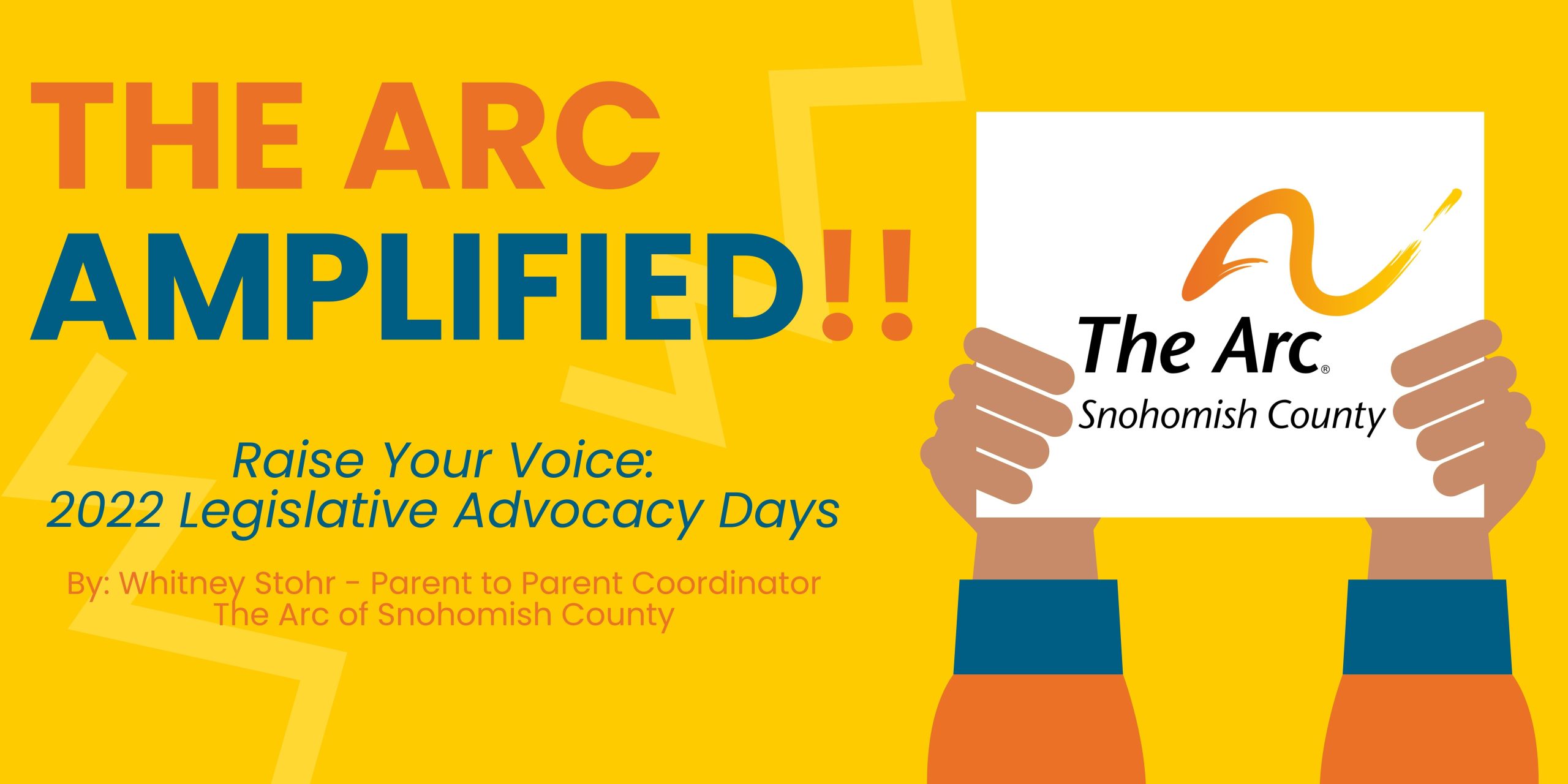
Raise Your Voice: 2022 Legislative Advocacy Days
The start of the 2022 state legislative session is just around the corner. Now is the time to re-engage in advocacy!
Each year, The Arc of Washington State organizes a series of ADVOCACY DAYS to provide opportunities for the disability community to engage in the legislative process, inform their elected officials on issues that impact our community, and drive policy change at the state level.
Due to COVID-19, legislative meetings, as well as The Arc Advocacy Days, have transitioned to a virtual platform. This will remain in effect during the 2022 session.
This is a good thing! While it is always nice to meet and talk with legislators face-to-face, a virtual option increases accessibility and allows disability advocates from across the state to participate in the activity that happens in Olympia.
The Arc of Washington State invites individuals with intellectual and developmental disabilities (IDD), their families, friends and service providers to participate in one or more of the planned Advocacy Days.
Participation is easy! Register using the links below, and you will receive information by email about joining the meeting.
Advocacy Day Calendar
January 12th
- Briefing on IDD Legislative Issues: REGISTER HERE
- Statewide Legislative Reception: REGISTER HERE
January 19th — Topic: Housing Accessibility — REGISTER HERE
January 26th — Topic: Civil Rights / Nothing About Us, Without Us — REGISTER HERE
February 2nd — Topic: Employment & Day Services — REGISTER HERE
February 9th — Topic: Barriers to Transportation — REGISTER HERE
February 16th — Topic: Caregiving of Children & Adults — REGISTER HERE
February 23rd —Topic: Meeting All Needs in Education — REGISTER HERE
March 2nd — Topic: Healthcare for People with IDD — REGISTER HERE
Before each meeting, consider a situation you have experienced in your life that highlights policy needs or service gaps, related either to your disability or to your role as a parent or caregiver. Come ready to share that story! (Click here to learn more about the legislative priorities of community groups and coalitions within the wider disability community in our state.)
How to Get Involved in Advocacy! Thanks to the gift of modern technology, you can engage in advocacy efforts without ever leaving your home. Here are a few steps you can take right now, and in the weeks and months ahead:
- Watch this pre-Legislative Session video, by The Arc of Washington State, to learn more about the upcoming Advocacy Days and issues important to the IDD community: be/TQRTBKZ37ec.
- Use this handy “District Finder” tool to search for your home address and discover both your state and Federal representatives: leg.wa.gov/DistrictFinder.
- Track legislative bills and learn more about them at leg.wa.gov/billinfo
- Participate in one of The Arc’s 2022 Advocacy Days via Zoom, or contact your representatives on your own to tell them which issues are important to you and your family, and whether you support or oppose a specific bill(s).
**********
Whitney Stohr is a Parent to Parent Coordinator at The Arc of Snohomish County. She is passionate about advocating for medically complex children and children with disabilities and their families. She is a mom and medical caregiver herself, who is energized by working closely with other parent/family caregivers. She lives with her three-year-old son Malachi and husband Jason in Lynnwood. Connect with her on Instagram @rollin.w.spinabifida. Contact: whitney@arcsno.org.
New Year Resolutions for the Busy Parent-Caregiver: Commit to Taking a Walk

New Year Resolutions for the Busy Parent-Caregiver:
Commit to Taking a Walk
A new year is here!
I hope this year brings with it a sense of renewed hope, new goals and new adventures with a side of fun and family memories to each of you, your partners, your children and your family as a whole. I hope that you ask and accept help when offered. I hope that you carve out time for yourself, to try new things, explore new interests, and meet personal goals.
As a busy parent (or kinship) caregiver, finding that time to prioritize your needs, and commit to self-care, can be challenging. Family caregivers are BUSY — with a capital B – U – S – Y! Making yourself a top priority is much easier said than done.
But, also: We must take care of ourselves!
So, say it with me: In 2022, I will prioritize my needs!
Self-care is essential. But, that does not mean that self-care must be something huge! Self-care can be simple moments scattered throughout your day. It can be five minutes of deep breathing, stretching or Sun Salutations. It can be carving out time alone to simply sit down and think, read or journal. (Click here for more on self-care)
This year, commit to a Self-Care Resolution.
Again, it can be something very simple. For example, commit to taking a walk outside — even if only for 10-15 minutes, 2-3 times each week.
There are many health benefits associated with the physical activity of walking. But, moreover, consider how even a short walk outdoors, in the fresh air, might impact your mood, your headspace, and your energy levels.
If walking works for you… If you feel that added benefit… Then perhaps, set a goal for 2022 to walk a certain amount of time, or a certain number of days each week — either alone or with a friend.
It is simple and achievable.
And that is the gold standard for the busy parent-caregiver!
**********
Whitney Stohr is a Parent to Parent Coordinator at The Arc of Snohomish County. She is passionate about advocating for medically complex children and children with disabilities and their families. She is a mom and medical caregiver herself, who is energized by working closely with other parent/family caregivers. She lives with her three-year-old son Malachi and husband Jason in Lynnwood. Connect with her on Instagram @rollin.w.spinabifida. Contact: whitney@arcsno.org.
Be Prepared: Winter Emergency Car Kits for Medical Families
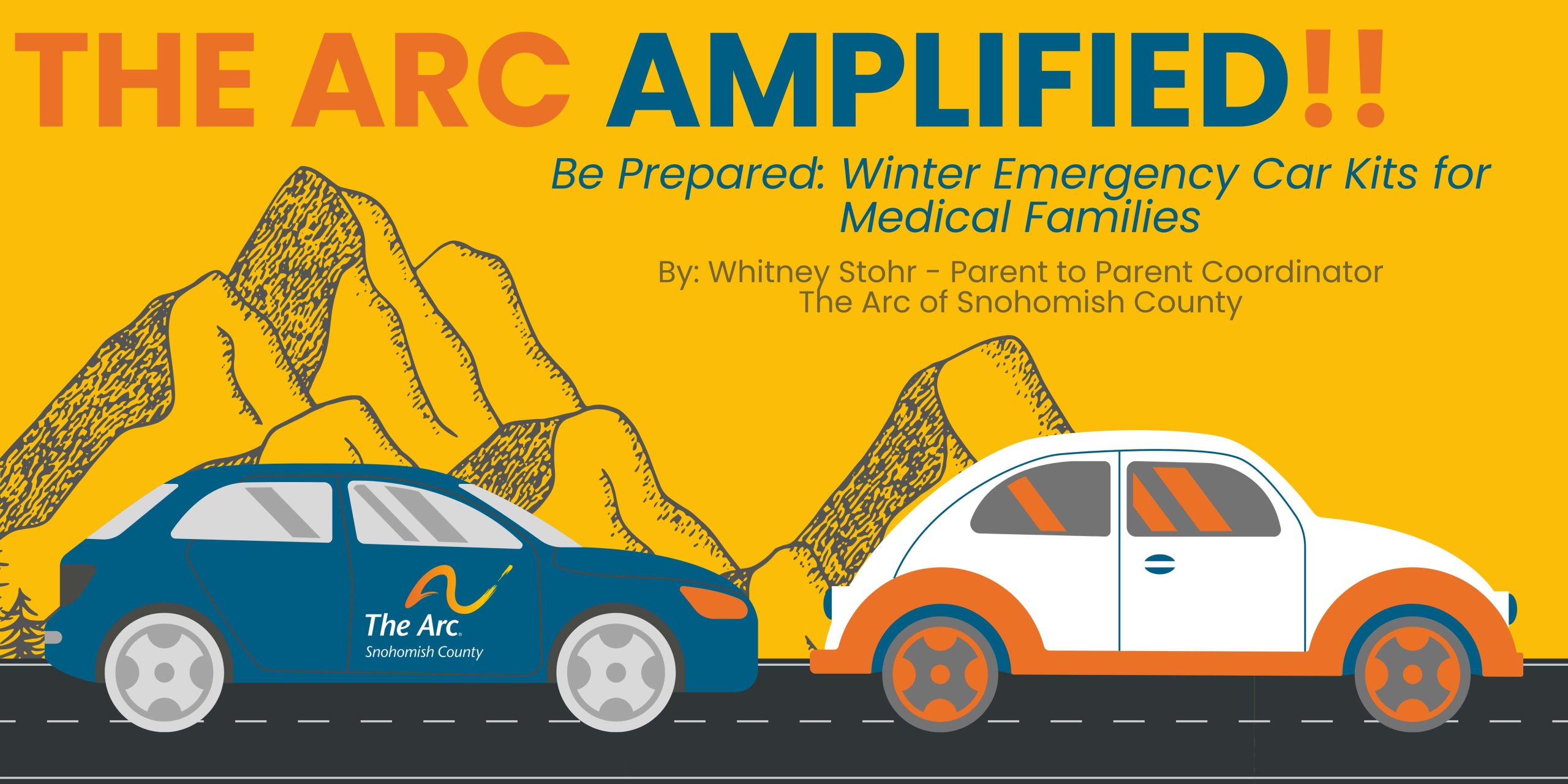
Be Prepared: Winter Emergency Car Kits for Medical Families
The first, big snowfall of the season always serves as a reminder to check and update your roadside emergency kits. These are the supplies you can turn to in the case of a serious emergency (vehicle accident or otherwise).
Roadside emergency kits are especially important if you are traveling long distances, over mountain passes in the winter months, or have someone in your car with a significant medical condition. (If you do not yet have an emergency kit in your car, make 2022 the year to get it done! It could save a life.)
You can find quality lists of items to include in your winter emergency kit with a quick Google search. The basics include:
- Warm blankets — Throw a few in your trunk!
- Flashlights and extra batteries
- Road flares or emergency lights
- Matches (stored in a waterproof bag or container)
- Small tool kit
- Jumper cables
- First Aid kit
- Phone charger
- Ice scraper/brush
- Kitty litter (for traction)
- Bottled water
- Non-perishable, high-energy food (e.g. nuts, dried fruit, protein bar)
- Other warm weather gear (e.g. rain poncho, winter gloves/hat, wool socks, hand warmers)
(Source: National Safety Council
Additionally, if you are the parent of a child with a serious medical condition, or you or your spouse have health challenges, it is equally important to keep extra medical supplies on hand. These necessary supplies will vary based on the individual’s specific needs, but some basics may include:
- Printed summary (short, one-pager) of diagnoses and other need-to-know information, including allergies, specialty medications (with dosage information), and individualized FAQs about your child (e.g. how do they communicate? Are there specific behaviors that paramedics need to know? Etc.)
- A 911, in-case-of-emergency list — include contact information for other family members, doctors, pharmacies, home hospital/specialists
- Health insurance information (including copies of airlift/medical flight insurance cards)
- Several-day supply of emergency medications
- Extra medical supplies and emergency equipment
- Clothing, diapers & diaper wipes
- Special foods/formulas & feeding supplies (e.g. back-up feeding pump, gravity bags, an extra MIC-KEY button, lubricant packets, extra syringes)
- Jugs of sterile water
- Extra face masks, hand sanitizer & Clorox wipes
- Finger oximeter
- Portable power support, or back-up battery, strong enough to run medical equipment
- Any additional “life-saving” equipment that may be needed (e.g. resuscitation bags, extra oxygen tubing and connectors, etc.)
It is also a good idea to use a bag that can be easily identified by paramedics as containing medical supplies. (Examples: A red, “medical-looking” duffel or a bag with a medical cross) Consider the type of bag that would draw the attention of emergency personnel if you, and all other adults in the car, were unresponsive.
Also, remember: Always fill up on gas before heading out on a long trip during the winter months. You will be happy you did if you get stuck at the top of the pass or end up off the road in the middle of the night. (Click here for additional winter weather, car-prep tips.)
**********
Whitney Stohr is a Parent to Parent Coordinator at The Arc of Snohomish County. She is passionate about advocating for medically complex children and children with disabilities and their families. She is a mom and medical caregiver herself, who is energized by working closely with other parent/family caregivers. She lives with her three-year-old son Malachi and husband Jason in Lynnwood. Connect with her on Instagram @rollin.w.spinabifida. Contact: whitney@arcsno.org.
SNAP These Holiday Shots Before Bidding Farewell to 2021

SNAP These Holiday Shots Before Bidding Farewell to 2021
“Pics or It Never Happened!”
It is a common phrase on social media. Usually, it is said as a way to ask for proof of a claim made by an original poster. And, while I do fully believe that some moments are best lived… well… you know… in the actual moment, as parents, we also love looking back at those special moments that were captured on camera. As the details of that moment grow hazy in our minds, the photographic evidence remains as a reminder, as a way to refresh those memories, and, in a way, relive them for the rest of our lives.
So, before this holiday season officially comes to a close with the ringing in of the New Year, here is a list of fun shots to snap.
1. Put on the Santa Hats and smile your jolliest of grins in front of the Christmas Tree.
2. Take a trip to the local, community Christmas tree, Menorah or other symbol of the holiday season for a quick family pic. (Quick! Before city staff have a chance to take it down!)
3. Have a new, little one at home? Do not let this holiday season pass without capturing a “baby in a stocking” shot!
4. Matching, family PJs pic. Need I say more?! (If you think it seems overdone, that is probably because it is absolutely, 100% — in fact — overdone, but also… it is completely adorable! So, overdone or not, do not forego your chance at a photo!)
5. Ugly sweaters and outdoor activities. Pull on those sweaters and head outside for an afternoon of ice skating, sledding, a winter hike or a quick trip to the mountain.
6. If you are part of a faith community, make time for a family photo after the last service of 2021. Use the remaining holiday décor as a beautiful backdrop.
7. A holiday themed photo with the family pets. Remember to include your furry family members in your captured memories! Years from now, photos with Fido are sure to make you smile.
8. Capture that special, New Year’s Eve family tradition. Do you bake as a family on New Year’s Eve? Work together on a gigantic puzzle? Eat black-eye peas or open the doors at midnight? Awesome! Snap a pic of this year’s fun!
9. An exciting, family pic sporting funky 2022 specs, party hats and poppers! (Now is the time to gear up! Click here for ideas.)
10. “CHEERS!” the New Year with sparkling cider in fancy flutes.
**********
Whitney Stohr is a Parent to Parent Coordinator at The Arc of Snohomish County. She is passionate about advocating for medically complex children and children with disabilities and their families. She is a mom and medical caregiver herself, who is energized by working closely with other parent/family caregivers. She lives with her three-year-old son Malachi and husband Jason in Lynnwood. Connect with her on Instagram @rollin.w.spinabifida. Contact: whitney@arcsno.org.
Winter 2021 Advocacy Spotlight: Jillene Ford

Winter 2021 Advocacy Spotlight: Jillene Ford
Recently, The Arc of Snohomish County held our annual Legislative Coffee series. Our host for the 39th Legislative District was Jillene Ford. Here is her advocacy experience:
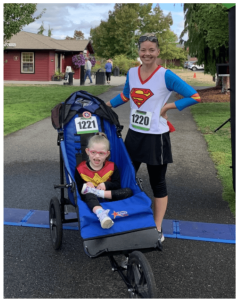 “This is the second time I hosted,” said Ford. “What I’m really trying to do is say ‘yes’ more often to this type of thing. Public speaking is never something I desired to do, but with [her daughter] Natalie, I feel I have a very unique platform.”
“This is the second time I hosted,” said Ford. “What I’m really trying to do is say ‘yes’ more often to this type of thing. Public speaking is never something I desired to do, but with [her daughter] Natalie, I feel I have a very unique platform.”
“My dad has had ALS for 9 years. So I think that was a good, eye-opening experience for me when it came to mobility issues and ADA accessibility, and now with my daughter, I have a unique perspective. And if I have the ear of [legislators], I feel the need to raise awareness, advocacy, and improve the life of people with various mobility issues, caregiving issues. I think I have a unique experience in my life and I feel grateful to share that.”
Jillene’s daughter Natalie is seven and has developmental disabilities. She uses a wheelchair and requires 24-hour care. Getting accommodations from the state has proven to be difficult.
“We had modifications approved in September for a new chair, so she won’t slip and choke, and we have yet to receive them.”
Beyond advocating for mobility issues, Jillene also uses it as an opportunity to bond with her daughter.
“[I run] with Natalie in 5Ks and my church got together and just bought us this really nice bike carrier to do biathlons. I would really love to encourage other families and people to do this, and it’s a fun way to participate with someone with mobility issues. It would be really fun to see more of that in Washington state. I want to encourage families to get out there and find things to do with your kiddo or your loved one that is fun for both of you. It’s my goal to keep doing these things, and it’s a win-win.”
Jillene has also used her advocacy efforts to help get an accessible swing installed in Haller Park in Arlington, and has served on the Snohomish County Equity and Inclusion Task Force.
**********
If you are interested in learning more about The Arc’s legislative advocacy efforts, or want to get involved, contact Rachel Kube at rachel@arcsno.org, or Jake Murray at jake@arcsno.org.
**********
Originally published by: The Arc of Snohomish County in Leadership Newsletter (2021, Issue 4)
Last-Minute Stocking Stuffers for Your Little Tubie

Last-Minute Stocking Stuffers for Your Little Tubie
December 25th is now right around the corner. For many, the presents are under the tree. Gingerbread houses are already long built. Christmas dinner is planned out, and a grocery service has already delivered the ingredients for grandma’s special, green bean casserole.
The moms and the dads, and the aunts and uncles, and the grandparents and family friends, busy themselves wrapping gifts and stuffing stockings, late at night, away from prying eyes.
But, those stockings!!
As the doting mother of a “tubie” toddler, stocking stuffers can be quite the challenge. A tubie is a loving reference to a child who eats food through a feeding tube. Feeding tubes are wonderful, life-saving and health-sustaining, medical tools. My husband and I are immensely grateful that a feeding tube has provided a way for our son to receive nutrition, grow and thrive.
 However, the fact that my son does not consume food by mouth limits our options for stuffing his Christmas stocking with most of the typical fillers. Not a single fruit snack, mandarin orange or chocolate coin will be found in our stockings. (Which is actually probably better anyway!)
However, the fact that my son does not consume food by mouth limits our options for stuffing his Christmas stocking with most of the typical fillers. Not a single fruit snack, mandarin orange or chocolate coin will be found in our stockings. (Which is actually probably better anyway!)
So, how do you stuff a stocking for your #tubie?
That is the million dollar question! It is also a perennial question I struggle to answer myself. And, when you do not have the answer to a question, what do you do? Naturally, you decide to crowd-source yourself an answer. At least, that’s what I did.
I turned to my Facebook community, and — as always —they delivered!
So, for all the parents and families of tubies out there, who are struggling to find ideas for stocking stuffers, here is a list of last-minute, non-food options:
1. Winter Gear — A cute, stocking hat and gloves can easily be rolled up and stuffed into a stocking. (Wrap before stuffing to give your child more opportunities to work on grabbing, pinching, and tearing paper. #EverydayTherapy)
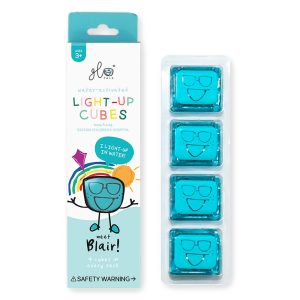 2. Chewies — Chew jewelry or toys are one option for kids that seek oral sensory input and fidgets. There are many choices, styles and colors, and they are small enough to fit in almost any stocking. They also provide oral and tactile exploration for kids unable to eat food by mouth.
2. Chewies — Chew jewelry or toys are one option for kids that seek oral sensory input and fidgets. There are many choices, styles and colors, and they are small enough to fit in almost any stocking. They also provide oral and tactile exploration for kids unable to eat food by mouth.
3. Light-up Water Toys — Small toys that light up in water can add a bit of magic to bath time.
4. Stickers — Stickers are great for both play and learning. Many kids love stickers, and parents can use sticker-play to work on fine motor skills, or body part identification, or any number of other activities.
5. Playdoh or Slime — Playdoh, slime, or other dough-like materials are another sensory item that make excellent stocking stuffers. Kinetic sand is another idea.
6. Art Supplies — Small packs of color crayons or markers, or a watercolor paint pack can also be slipped into stockings. Wikki Stix are another fun art item.
7. Wristwatch — A fun wristwatch featuring your child’s favorite cartoon or animated characters will make them feel like a big kid (and give parents a tool to work on teaching time).
8. Socks — Cute, fluffy or “fancy” socks are also solid stocking stuffers. Especially, if your family typically sticks to functional and durable sports socks throughout the year, a splurge on a fancy pair of knee highs or socks with cartoon characters can be fun to pull out of a stocking on Christmas morning.
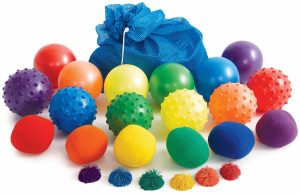 9. Sensory Balls — Sensory balls can be a big hit — especially among the toddler crowd. They often come in packs that can be opened and individually stuffed into stockings. (Hello, space fillers!)
9. Sensory Balls — Sensory balls can be a big hit — especially among the toddler crowd. They often come in packs that can be opened and individually stuffed into stockings. (Hello, space fillers!)
10. Other Oral Exploration Tools — Cool toothbrushes, reusable silly straws to practice sipping or blowing, fun shaped spoons or other adaptive utensils, etc.
**********
Whitney Stohr is a Parent to Parent Coordinator at The Arc of Snohomish County. She is passionate about advocating for medically complex children and children with disabilities and their families. She is a mom and medical caregiver herself, who is energized by working closely with other parent/family caregivers. She lives with her three-year-old son Malachi and husband Jason in Lynnwood. Connect with her online at whitney@arcsno.org.

